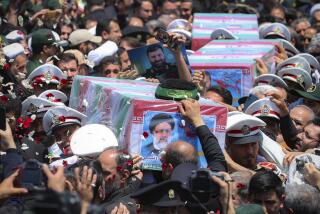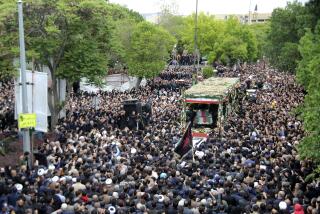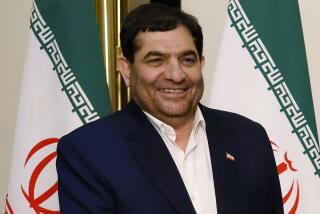Iran media cast doubt on reported suicide in Dubai
- Share via
Reporting from Tehran and Beirut — Iranian media are raising questions about the reported suicide in a Dubai, United Arab Emirates, hotel room of the son of a prominent Iranian politician and former Revolutionary Guard commander.
The body of Ahmed Rezai was found Saturday in his hotel suite, according to news reports. He was the son of Mohsen Rezai, secretary-general of Iran’s influential Expediency Council, which advises the supreme leader, Ayatollah Ali Khamenei.
The elder Rezai ran unsuccessfully as a conservative challenger to President Mahmoud Ahmadinejad in 2009’s disputed election. Charges by reformists that the incumbent stole the election led to widespread protests and a violent crackdown by authorities.
The Abu Dhabi-based English daily the National said the body of Rezai, 31, was found at the four-star Hotel Gloria in Dubai Media City. Police believe his death was a suicide, according to the newspaper.
“There is no criminal suspicion,” the paper quoted Khalil Mansouri, head of the Dubai police’s criminal investigation department, as saying. Mansouri said forensic tests indicated that Rezai had been dead about 12 hours before his body was found.
A police official speaking on condition of anonymity told the Associated Press that the body was found by hotel staff and that one of Rezai’s wrists was slit.
Reports by Iranian news outlets cast doubt on that report. The official Islamic Republic News Agency, the semiofficial Fars agency and Tabnak, a website close to Mohsen Rezai, all characterized the death as suspicious. Another semiofficial news agency, Mehr, said the younger Rezai died of an electrical shock.
The elder Rezai is among a group of Iranians wanted by Interpol in connection with the 1994 bombing of a Jewish cultural center in Buenos Aires that killed 85 people. Argentina accused Iran of being behind the attack and the militant group Hezbollah of carrying it out. Iran has denied involvement, and Rezai told The Times in a 2009 interview that the accusation against him was a “sheer lie.”
In his presidential campaign, Rezai accused Ahmadinejad of mishandling the economy and being “too aggressive” on foreign policy.
His relationship with his son was shrouded in controversy. Ahmed Rezai reportedly left Iran for the United States in 1998 after having criticized his father and the government of the Islamic Republic, returned five years later and left again in 2009.
Iranian filmmaker Ebrahim Hatamikia is said to have taken inspiration from the Rezais’ complex relationship for his 2000 feature, “Dead Wave,” which explores the generation gap between veterans of the 1980-88 Iran-Iraq war and their children.
Special correspondents Mostaghim and Sandels reported from Tehran and Beirut, respectively. Times staff writer Patrick J. McDonnell in Beirut contributed to this report.
More to Read
Sign up for Essential California
The most important California stories and recommendations in your inbox every morning.
You may occasionally receive promotional content from the Los Angeles Times.












